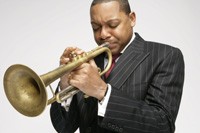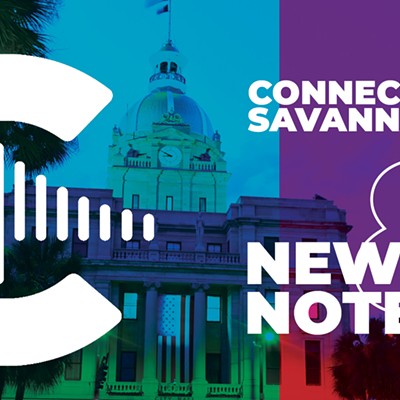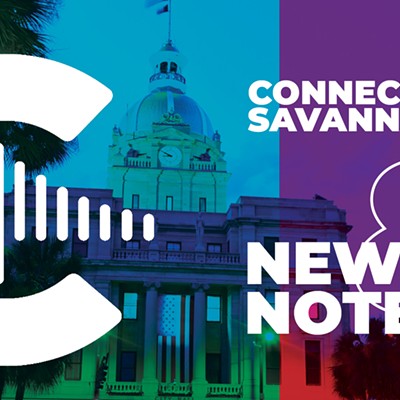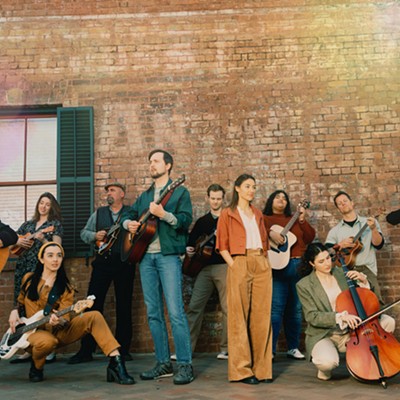AREA MUSIC LOVERS are no doubt “jazzed” to the max about the upcoming appearance by trumpeter Wynton Marsalis and his Jazz at Lincoln Center Orchestra.
The single biggest fund-raising event of the 2009 season for the internationally celebrated Savannah Music Festival, this intimate show at the Lucas Theatre finds the nine-time Grammy winner (he also holds a Pulitzer Prize for Music) and his big band playing in the smallest venue along their entire Southern tour — and premiering a brand-new arrangement of a classic Johnny Mercer tune (commissioned by the SMF) in honor of our local songwriting icon’s Centennial Year.
I caught up with the always-busy Rob Gibson, the Music Fest’s Executive & Artistic Director and a longtime associate of Marsalis’ (Gibson was the Founding Director of Jazz at Lincoln Center) to learn more about this event and its importance to the SMF’s Mission Statement and bottom line.
This concert is serving as the SMF’s single largest fund-raiser for its 2009 event, and replaces all the other galas and auctions that have previously been held. What influenced the decision to shift the fund-raising strategy in this way?
Rob Gibson: Initially we used to do an Annual Wine Gala. Last year that moved into more of a Music Gala with an auction. But we figured out that what we do best is put on concerts. So, we felt that putting on a really first-class ensemble and charging a bit more for the tickets is probably the best way to go about trying to augment the additional monies we normally raised from those gala events.
Had you already booked the Jazz at Lincoln Center Orchestra for this show before deciding to make it the big fund-raiser, or was this show brought to the Lucas specifically for that purpose all along?
Rob Gibson: We made the decision over a year ago and this show was booked specifically for that purpose.
For some reason, I thought when this was originally announced that it would be held at the Johnny Mercer - was that correct, and was it moved to the Lucas, or am I confused?
Rob Gibson: It was originally gonna be at the Trustees Theater, but then the Lucas became available. The Mercer was never available, because that’s the opening night of the Barnum & Bailey Circus. Even though that’s taking place in the main arena and our show would have been held in the smaller theater, the entire parking lot would have been taken up with the animals. So, to do the Jazz at Lincoln Center Orchestra there would have been a circus itself! (laughs)
Are Wynton and his group coming in for a reduced fee to help support the SMF?
Rob Gibson: It’s a little bit less than their normal fee. I mean, they’re on a Southern tour right now. I think they played Chapel Hill last night and then they’re going to Florida for a few days. So, yes, we got a bit of a break, but they have to stay in business too.
As someone who was intimately involved with the entire scope of Jazz at Lincoln Center, how would you describe the type of show that audience members at this Jan. 29 concert will see - for folks who have never seen this group perform before?
Rob Gibson: I believe this particular program they’re touring right now features a lot of their repertoire from the past half-century — as opposed to the previous half-century. There’s numerous original arrangements by the JLCO’s bandmembers of different works, including one we commissioned: the Johnny Mercer tune “Blues In The Night,” arranged by Ted Nash. I happened to be in New York last night and dropped by their rehearsals. Coincidentally, they were just about to work on that piece for the first time. They rehearsed it for about 35 or 40 minutes, and it sounded really good. It’s also the piece we’re giving away to this year’s crop of high school jazz musicians in our Swing Central program. So, the commission was a two-fold thing. It dovetailed with their performance here, so it can be premiered in Savannah.
So, they’ll play it publicly at the Lucas, and then add it to their repertoire for the rest of the tour?
Rob Gibson: It would not surprise me if they run through it at a concert or two before they get here. Wynton might sneak it in. (laughs) Sometimes you don’t want to play a commissioned piece live for the first time in front of the folks who requested it. I know that if (Duke) Ellington had a piece commissioned for Carnegie Hall, he’d play it in Iowa beforehand. The actual, official premiere will be here at our show, but the musicians always want to make sure they’ve had enough rehearsal time with the piece.
Wynton Marsalis has been something of a polarizing figure in the jazz world for many years now - and he seems to hold the public at bit of a distance. As someone who knows and has worked with him closely, how would you describe Wynton Marsalis on a personal level, and what do you think is the single biggest misconception that people who don’t know him may have of him?
Rob Gibson: Well, in actuality, he’s a very public figure. He went to CNN.com just the other day and wrote a piece.
I saw that yesterday and was very impressed.
Rob Gibson: You can see that type of thing from him regularly. He’s constantly working with youth, teaching them and helping to promote jazz to young people. That’s because he knows doing so is the only way that music can survive. I mean, if you watched the big Inauguration Celebration yesterday, there was nothing even approaching jazz on display there.
I didn’t see it, but I had read the lineup and that surprised me.
Rob Gibson: Bono always gets his little slot, though, huh? See, it has everything to do with the media and popularity and selling records. It has nothing to do with quality music. Not that Stevie Wonder or Bono hasn’t done anything of worth — but why are the same figures always there? What Wynton does, and what I tried to do together for more than ten years is to connect jazz with the industry in America. By industry, I mean anything commercial. Ultimately, you wanna be as commercial as you can, while still maintaining your artistic integrity. So, if you can connect yourself to the media through devices, like clothing or jewelry or recordings, then ultimately, that’s a positive. It’s very difficult to do that with jazz, which has all but been removed from the general consciousness.
That’s really amazing, when you consider how much of America’s fabric over the past century is decorated with jazz music.
Rob Gibson: Well, it is and it isn’t. It’s been removed from the consciousness of most Americans for the past 50 years, and some might even say longer. I mean, I’m hearing the Martin Luther King Day Parade going down the street out my window right now, but I don’t hear any jazz.
For this show, the JLCO will be playing big-band arrangements of Thelonious Monk compositions. Who did the arrangements, and were they created specifically for this orchestra, or were these charts that had been floating around already that Wynton and his bandmates simply decided to tackle?
Rob Gibson: The first big band arrangements of Monk’s music were done by Hall Overton and they were done at Town Hall back in the ‘50s, and then later there were further arrangements done in the ‘60s. Those were sort of the standard bearers/ I know that later on, different people have arranged these works for orchestra, and certainly some of the folks in the JLCO have done that. I know there’s gonna be a much broader array of music on this program besides the Monk works, but I think that Monk’s music remains a foundation in jazz.
I’m told that there will be several nods to Mercer’s legacy in this year’s installment of the SMF. What sort of response have your received from the musicians you have approached about including Mercer-related material into their shows?
Rob Gibson: I mean, a lot of people already do Mercer songs in their shows, and they each have their own favorites. But, as you know, there’s always a Mercer song that was written with Hoagy Carmichael or with some other great composer. If you ask someone to play an instrumental, they know that Johnny Mercer wrote the words to it, but they are often completely unfamiliar with the lyrics. For example, at this year’s Savannah Music Fest, Bucky Pizzarelli will play a song of Mercer’s, but it won’t have any words to it. That’s cool, though.
Wynton like to tell a story about when he was young and out on the road with Art Blakey’s band. He’s up there on stage playing all these crazy trumpet solos, and really cooking. When they got off stage, Blakey looks at him and says, “What the fuck was that? Have you ever listened to the words to that song? I know if you had, you wouldn’t have been up there playin’ all that bullshit all over it!” So, Wynton realized then that no, he hadn’t really listened to the words, and that he needed to. Part of that was just being young, but part of it has to do with understanding just what it is that lyricists do. Mercer may have been more of a lyricist than a musician, but he worked well alongside great musicians. What’s so amazing is that when you sit and read his lyrics, you notice how relevant and profound many of them are.
Just to be read as one would poetry.
Rob Gibson: Yes, just to be read. I grew up in a house where my father used to sing that song “Accentuate The Positive” in the shower. Man, it was a great song! Later on, I heard NRBQ and all these other bands do their own versions of it, and I think it’s still relevant right now. If you turn on the TV nowadays, you can get pretty depressed. But if you read the lyric to that song, you can say to yourself, okay, I don’t have to take my time that seriously.
Ryan tells me you all have already sold over sixty percent of the seats for this concert. What would you say are the odds this will be a complete sellout?
Rob Gibson: You know, it’s hard to say. We hope that people will want to hear the concert and help support the Festival. This is a good way to do it. The big advantage is the tax write-off. If you buy a $125 ticket, you get a big chunk of that money off your taxes. Now, if you went to see the Jazz at Lincoln Center Orchestra in New York at one of their regular performances, that would be $110 right there. So, whet we’re asking for is higher than what most people are used to paying to see a show in Savannah, but it’s actually quite in line with what major artists charge in other cities.
The comment I hear from all sorts of people in the music and concert business who see our Music Fest programs and brochures is their amazement at how cheap our shows are! My dad always recommends buying the cheap seats, and in the Lucas or the Mercer Theater there really ain’t a bad seat in the house. We’re not talking about Madison Square Garden here! (laughs) So, if you bought the least expensive tickets to some of our 2009 concerts, you could probably see five shows in one day and spend $100. Now, with the quality of the entertainment and artistry we have on display, I think that’s a pretty good deal. We’ve got zydeco concerts for $20. Of course, maybe if you were in Lafayette, La., they’d be $12.
Yeah, but you’d have to pay to get yourself all the way down there.
Rob Gibson: Exactly! (laughs)
If the show is completely sold out, how much money will it actually net for the SMF’s bottom line?
Rob Gibson: On any kind of fund-raiser like this, we’re trying to net around $50,000 or something like that. I think we’ll be in that zone if we sell it out, but right now, if we don’t sell another ticket, we’d probably just about break even. That’s why you want to sell every single seat. But I think the Jazz at Lincoln Center Orchestra is one of the finest bands playing in the world today. You have 15 musicians, who are each extraordinary in their own right. They’re great ensemble players and can read anything you put in front of them — but they’re also wonderful improvisers. There simply aren’t many bands operating on that level anywhere in the world today.
I’ve followed this band since it was created in the early ‘90s, and I can tell you that even though the personnel have changed drastically over the years, this is the best it’s ever sounded. Now, I wouldn’t tell you that Ali Jackson is a better drummer than Herlin Riley, but I’ll say the band as a whole sounds better than it has ever sounded. That’s what Ellington was able to do. A lot of people consider the Ellington band of the ‘40s to be his finest. But later on in the ‘50s and ‘60s, it was just a different kind of band. It swung as hard and it was more sophisticated music. That’s how it should work in perhaps all forms of art — except for something like ballet, which is based so much on a young person’s athletic ability. But artists should always be striving for greater sophistication in their craft.
Wynton Marsalis & The JLCO
When: 7 pm, Jan. 29
Where: Lucas Theatre
Cost: $65 - $250 (high level tix include cocktail reception with Marsalis and Co. at Local 11 Ten)




























